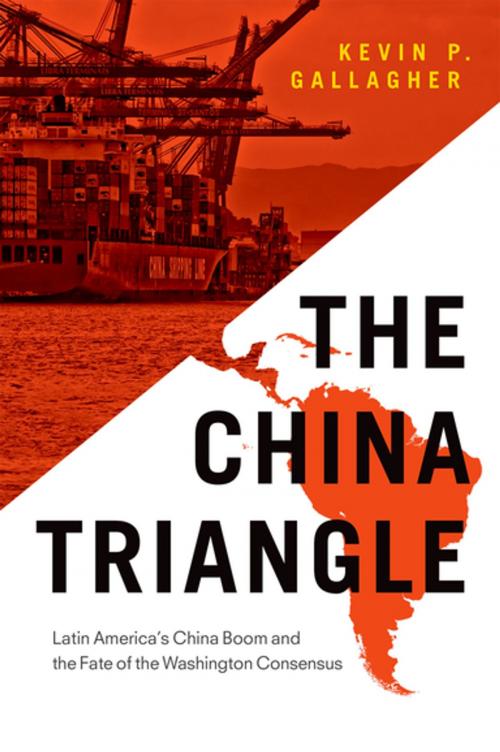The China Triangle
Latin America's China Boom and the Fate of the Washington Consensus
Nonfiction, Social & Cultural Studies, Political Science, International, Foreign Legal Systems, Business & Finance, Economics| Author: | Kevin P. Gallagher | ISBN: | 9780190246754 |
| Publisher: | Oxford University Press | Publication: | February 22, 2016 |
| Imprint: | Oxford University Press | Language: | English |
| Author: | Kevin P. Gallagher |
| ISBN: | 9780190246754 |
| Publisher: | Oxford University Press |
| Publication: | February 22, 2016 |
| Imprint: | Oxford University Press |
| Language: | English |
Since 1980, China has evolved from a poor and mostly rural society into one of the largest economies in the world. As it grew into a major industrial power, it demanded enormous amounts of steel for new factories and cities, copper for electronic wires, petroleum for cars and manufacturing plants, and soybeans and cattle to feed its workers. By the 1990s, many Latin American countries were riding China's coattails and beginning to prosper from the new demand. Ever since China entered the World Trade Organization at the turn of the century, Latin America supplied China with more and more of the primary commodities it needs and more. That in turn has produced one the most impressive periods of economic growth on the continent in fifty years. And it was more evenly spread too - a region infamous for its extreme inequality saw it decline by a couple of percentage points over the course of the era. In The China Triangle, Kevin P. Gallagher traces the development of the China-Latin America trade over time and covers how it has affected the centuries-old (and highly unequal) US-Latin American relationship. He argues that despite these opportunities Latin American nations have little to show for riding the coattails of the 'China Boom' and now face significant challenges in the next decades as China's economy slows down and shifts more toward consumption and services. While the Latin American region saw significant economic growth due to China's rise over the past decades, Latin Americans saved very little of the windfall profits it earned even as the region saw a significant hollowing of its industrial base. What is more, commodity-led growth during the China boom reignited social and environmental conflicts across the region. Scholars and reporters have covered the Chinese expansion into East Asia, Southeast Asia, Australasia, Africa, the US, and Europe. Yet China's penetration Latin America is as little understood as it is significant-especially for America given its longstanding ties to the region. Gallagher provides a clear overview of China's growing economic ties with Latin America and points to ways that Latin American nations, China, and even the United States can act in order to make the next decades of China-Latin America economic activity more prosperous for all involved.
Since 1980, China has evolved from a poor and mostly rural society into one of the largest economies in the world. As it grew into a major industrial power, it demanded enormous amounts of steel for new factories and cities, copper for electronic wires, petroleum for cars and manufacturing plants, and soybeans and cattle to feed its workers. By the 1990s, many Latin American countries were riding China's coattails and beginning to prosper from the new demand. Ever since China entered the World Trade Organization at the turn of the century, Latin America supplied China with more and more of the primary commodities it needs and more. That in turn has produced one the most impressive periods of economic growth on the continent in fifty years. And it was more evenly spread too - a region infamous for its extreme inequality saw it decline by a couple of percentage points over the course of the era. In The China Triangle, Kevin P. Gallagher traces the development of the China-Latin America trade over time and covers how it has affected the centuries-old (and highly unequal) US-Latin American relationship. He argues that despite these opportunities Latin American nations have little to show for riding the coattails of the 'China Boom' and now face significant challenges in the next decades as China's economy slows down and shifts more toward consumption and services. While the Latin American region saw significant economic growth due to China's rise over the past decades, Latin Americans saved very little of the windfall profits it earned even as the region saw a significant hollowing of its industrial base. What is more, commodity-led growth during the China boom reignited social and environmental conflicts across the region. Scholars and reporters have covered the Chinese expansion into East Asia, Southeast Asia, Australasia, Africa, the US, and Europe. Yet China's penetration Latin America is as little understood as it is significant-especially for America given its longstanding ties to the region. Gallagher provides a clear overview of China's growing economic ties with Latin America and points to ways that Latin American nations, China, and even the United States can act in order to make the next decades of China-Latin America economic activity more prosperous for all involved.















